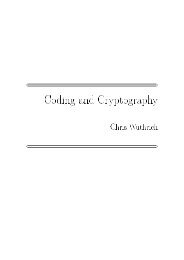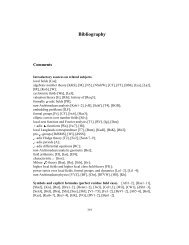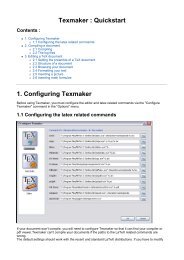ENTANGLEMENT OF GAUSSIAN STATES Gerardo Adesso
ENTANGLEMENT OF GAUSSIAN STATES Gerardo Adesso
ENTANGLEMENT OF GAUSSIAN STATES Gerardo Adesso
Create successful ePaper yourself
Turn your PDF publications into a flip-book with our unique Google optimized e-Paper software.
120 6. Gaussian entanglement sharing<br />
Summarizing, we have proven the following [GA15].<br />
➢ Monogamy inequality for all Gaussian states. The Gaussian tangle τG,<br />
an entanglement monotone under Gaussian LOCC, is monogamous for all,<br />
pure and mixed, N-mode Gaussian states distributed among N parties, each<br />
owning a single mode.<br />
6.2.3.1. Implications and perspectives. The consequences of our result are manifold.<br />
The monogamy constraints on entanglement sharing are essential for the security<br />
of CV quantum cryptographic schemes [102, 160], because they limit the information<br />
that might be extracted from the secret key by a malicious eavesdropper.<br />
Monogamy is useful as well in investigating the range of correlations in Gaussian<br />
valence bond states of harmonic rings [GA13] (see Chapter 13), and in understanding<br />
the entanglement frustration occurring in ground states of many-body harmonic<br />
lattice systems [272], which, following our findings, may be now extended to arbitrary<br />
states beyond symmetry constraints.<br />
On the other hand, the investigation of the consequences of the monogamy<br />
property on the structure of entanglement sharing in generic Gaussian states (as we<br />
will show in the next Chapters), reveals that there exist states that maximize both<br />
the pairwise entanglement in any reduced two-mode partition, and the residual distributed<br />
(multipartite) entanglement obtained as a difference between the left-hand<br />
and the right-hand side in Eq. (6.21). The simultaneous monogamy and promiscuity<br />
of CV entanglement (unparalleled in qubit systems) may allow for novel, robust<br />
protocols for the processing and transmission of quantum and classical information.<br />
The monogamy inequality (6.21) bounds the persistency of entanglement when one<br />
or more nodes in a CV communication network sharing generic N-mode Gaussian<br />
resource states are traced out.<br />
At a fundamental level, the proof of the monogamy property for all Gaussian<br />
states paves the way to a proper quantification of genuine multipartite entanglement<br />
in CV systems in terms of the residual distributed entanglement. In this respect,<br />
the intriguing question arises whether a stronger monogamy constraint exists on the<br />
distribution of entanglement in many-body systems, which imposes a physical tradeoff<br />
on the sharing of both bipartite and genuine multipartite quantum correlations.<br />
It would be important to understand whether the inequality (6.21) holds as<br />
well for discrete-variable qudits (2 < d < ∞), interpolating between qubits and CV<br />
systems (see Sec. 1.4). If this were the case, the (convex-roof extended) squared<br />
negativity, which coincides with the tangle for arbitrary states of qubits and with the<br />
Gaussian tangle for Gaussian states of CV systems, would qualify as a universal bona<br />
fide, dimension-independent quantifier of entanglement sharing in all multipartite<br />
quantum systems. In such context, a deeper investigation into the analogy between<br />
Gaussian states with finite squeezing and effective finite-dimensional systems (see<br />
Sec. 8.2.4), focused on the point of view of entanglement sharing, may be worthy.<br />
All of this research is in full progress.







